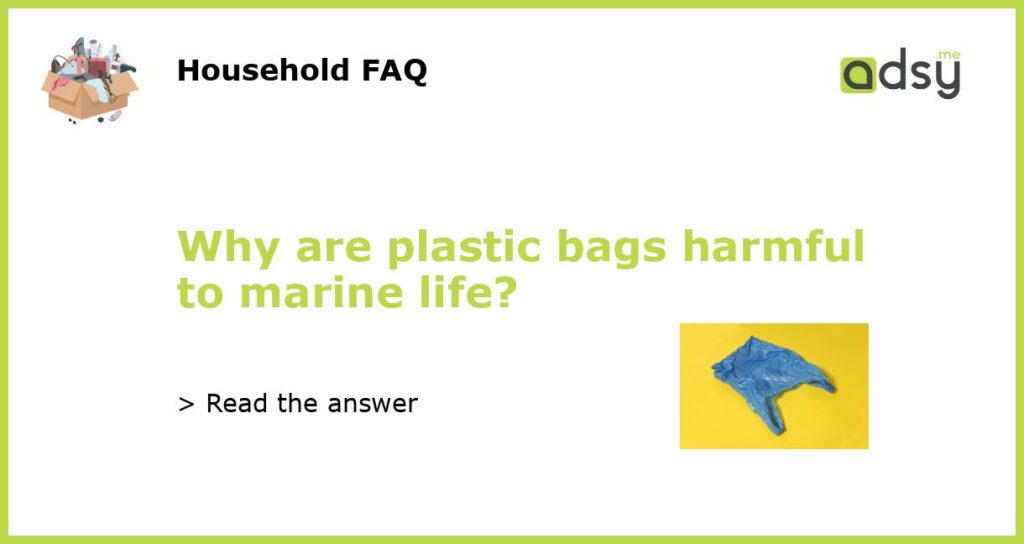Plastic Bags: A Silent Killer of Marine Life
Plastic bags have become an integral part of our daily lives, but their convenience comes at a great cost to marine life. These lightweight and durable bags are so widespread that they have become a significant source of plastic pollution in our oceans. In this article, we will explore the reasons why plastic bags are harmful to marine life.
The Impact of Plastic Bags on Marine Ecosystems
Plastic bags pose a grave threat to marine ecosystems due to their non-biodegradable nature. Unlike natural materials such as paper or cotton, plastic bags take hundreds of years to decompose. As a result, they persist in the environment, causing long-lasting harm. When plastic bags are dumped in the ocean, they break down into smaller microplastics, which are easily ingested by marine animals.
Marine animals mistake small plastic fragments for food, leading to severe consequences for their health. According to research, over 300 marine species have been documented to ingest plastic, including whales, sea turtles, seabirds, and fish. These animals can suffer from internal injuries, digestive blockages, and even death as a result. The accumulation of plastic in their bodies also poses risks to their reproductive capabilities, further endangering their long-term survival.
Environmental Pollution and Plastic Bag Desintegration
The environmental pollution caused by plastic bags is not limited to the harm they cause to marine life. The process of producing these bags also contributes to greenhouse gas emissions and depletes natural resources. The extraction, refinement, and transportation of the raw materials used in plastic bags require vast amounts of energy and water. Additionally, the disposal of plastic bags in landfills emits harmful greenhouse gases, such as methane.
Moreover, the process of degrading plastic bags releases toxic chemicals into the environment. As plastic breaks down into smaller fragments, it releases harmful chemicals like bisphenol-A (BPA) and phthalates. These chemicals can leach into the soil and water, posing a danger to both terrestrial and aquatic organisms.
Plastic Bags: A Threat to Global Biodiversity
The detrimental effects of plastic bags extend beyond marine life and impact global biodiversity as a whole. The pollution caused by plastic bags can lead to the destruction of ecosystems and the loss of countless species. Coral reefs, for example, are particularly vulnerable to plastic pollution. Plastic debris can smother coral and hinder their growth, ultimately leading to their death. Coral reefs are home to a vast array of marine species, and their decline can have cascading effects throughout the food chain.
Furthermore, plastic pollution affects the delicate balance of freshwater ecosystems. Many rivers and lakes around the world are plagued with plastic bags discarded by humans, leading to the degradation of water quality and the loss of aquatic species. The loss of these species disrupts the natural equilibrium of these ecosystems and can have far-reaching consequences for the environment and human societies that depend on them.
Reducing Plastic Bags: A Call to Action
To protect marine life and preserve our planet’s biodiversity, it is crucial to reduce the usage of plastic bags. Governments, businesses, and individuals all have a role to play in this endeavor.
Governments can implement policies and regulations to restrict the production and consumption of plastic bags. Some countries have already taken steps in this direction by implementing plastic bag bans or levying taxes on their usage. These measures incentivize individuals and businesses to seek alternative, more sustainable options.
Businesses can also contribute by adopting eco-friendly packaging practices and promoting the use of reusable bags. By offering incentives for customers to bring their own bags or opting for biodegradable alternatives, businesses can reduce their carbon footprint and inspire others to do the same.
On an individual level, we can make a difference by using reusable bags, recycling plastic bags properly, and raising awareness about the harmful effects of plastic pollution. Small changes in our habits can have a significant impact on reducing the demand for plastic bags and protecting our marine life.






